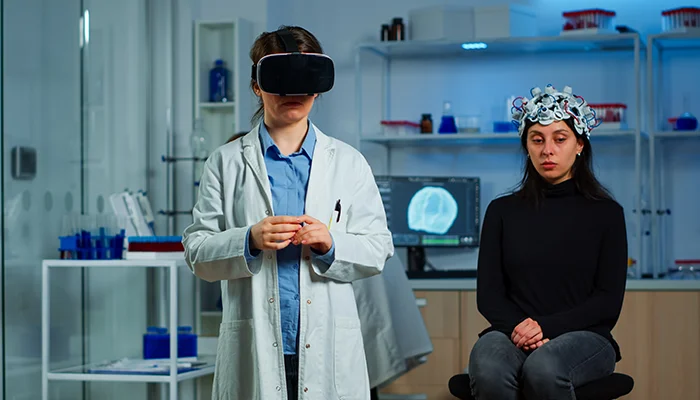AI in Mental Health: Use Cases, Opportunities, and Challenges

JUL, 02, 2024 17:55 PM
AI in Mental Health: Use Cases, Opportunities, and Challenges
The intersection of artificial intelligence (AI) and mental health is one of the most promising and transformative areas in healthcare today. AI has the potential to revolutionize mental health care by providing innovative solutions that enhance diagnosis, treatment, and patient care. However, alongside the opportunities, there are significant challenges that must be addressed to fully realize AI's potential in this field. This blog will explore the various use cases of AI in mental health, the opportunities it presents, and the challenges that need to be overcome.
Understanding AI in Mental Health
Artificial intelligence refers to the simulation of human intelligence processes by machines, especially computer systems. These processes include learning (the acquisition of information and rules for using the information), reasoning (using rules to reach approximate or definite conclusions), and self-correction. In mental health, AI can be used to analyze complex datasets, identify patterns, and make predictions that can assist in diagnosing and treating mental health conditions.
Use Cases of AI in Mental Health
1. Early Detection and Diagnosis
AI can significantly improve the early detection and diagnosis of mental health conditions. Traditional diagnostic methods often rely on self-reported symptoms and clinical observations, which can be subjective and vary between practitioners. AI, on the other hand, can analyze large datasets, including medical records, genetic information, and even social media activity, to identify patterns and markers associated with mental health conditions.
Example:
- Predictive Analytics: AI algorithms can analyze data from electronic health records (EHRs) to identify patients at high risk of developing mental health conditions such as depression or anxiety. This allows for early intervention and preventative measures.
2. Personalized Treatment Plans
AI can help create personalized treatment plans tailored to the individual needs of patients. By analyzing data on a patient's genetic makeup, lifestyle, and response to previous treatments, AI can recommend the most effective treatment strategies.
Example:
- Pharmacogenomics: AI can analyze a patient's genetic information to predict how they will respond to different medications. This can help in selecting the most effective drugs with the fewest side effects.
3. Enhancing Therapy and Counseling
AI-powered tools can support therapists and counselors by providing real-time insights and recommendations. These tools can also offer continuous support to patients outside of traditional therapy sessions.
Example:
- Chatbots and Virtual Assistants: AI-driven chatbots can provide immediate support to individuals experiencing mental health issues. These chatbots can offer coping strategies, provide information on mental health resources, and even alert human counselors if urgent intervention is needed.
4. Monitoring and Predicting Outcomes
AI can be used to monitor patients' progress and predict treatment outcomes. This continuous monitoring can help in adjusting treatment plans as needed and ensuring that patients receive the most effective care.
Example:
- Wearable Devices: AI-powered wearable devices can track physiological data such as heart rate, sleep patterns, and activity levels. This data can be used to monitor the mental health of patients in real-time and predict potential relapses.
5. Reducing stigma and increasing accessibility
AI can play a crucial role in reducing the stigma associated with mental health issues and increasing access to care, especially in underserved areas.
Example:
- Telepsychiatry: AI can enhance telepsychiatry services by providing tools for remote diagnosis and treatment. This can make mental health care more accessible to individuals in remote or rural areas.
Opportunities presented by AI in Mental Health

1. Improved Accuracy and Efficiency
AI can enhance the accuracy and efficiency of mental health care by providing objective data analysis and reducing human error. This can lead to more accurate diagnoses, effective treatments, and better patient outcomes.
2. Cost-Effective Solutions
AI can offer cost-effective solutions for mental health care. Automated tools and virtual assistants can reduce the need for frequent in-person visits, thus lowering healthcare costs for both providers and patients.
3. Continuous and real-time monitoring
AI enables continuous and real-time monitoring of patients, allowing for timely interventions. This is particularly important for individuals with chronic mental health conditions who require ongoing care.
4. Enhanced Patient Engagement
AI can enhance patient engagement by providing personalized and interactive tools that encourage patients to actively participate in their treatment plans. This can lead to better adherence to treatment and improved outcomes.
5. Breaking Barriers to Access
AI can help break down barriers to access by providing mental health support through digital platforms. This can be particularly beneficial for individuals who may be reluctant to seek help due to stigma or a lack of resources.
Challenges in Implementing AI in Mental Health
1. Data Privacy and Security
One of the major challenges in implementing AI in mental health is ensuring data privacy and security. Mental health data is highly sensitive, and any breach of confidentiality can have serious consequences for patients.
Solution:
- Robust Data Encryption: Implementing robust data encryption methods to protect patient information.
- Regulatory Compliance: Ensuring compliance with regulations such as the General Data Protection Regulation (GDPR) and the Health Insurance Portability and Accountability Act (HIPAA).
2. Ethical Concerns
The use of AI in mental health raises several ethical concerns, including the potential for bias in AI algorithms and the need for transparency in AI decision-making processes.
Solution:
- Bias Mitigation: Developing strategies to identify and mitigate bias in AI algorithms.
- Ethical Guidelines: Establishing ethical guidelines for the use of AI in mental health care to ensure transparency and accountability.
3. Integration with Existing Systems
Integrating AI tools with existing healthcare systems can be challenging. Many healthcare providers use legacy systems that may not be compatible with new AI technologies.
Solution:
- Interoperability Standards: Developing interoperability standards to ensure seamless integration of AI tools with existing healthcare systems.
- Training and Support: Providing training and support to healthcare providers to facilitate the adoption of AI technologies.
4. Acceptance by healthcare professionals
The acceptance of AI by healthcare professionals is crucial for its successful implementation. There may be resistance to adopting new technologies due to concerns about job displacement or the reliability of AI tools.
Solution:
- Education and Awareness: educating healthcare professionals about the benefits of AI and how it can enhance their work rather than replace it.
- Collaborative Approach: Involving healthcare professionals in the development and implementation of AI tools to ensure they meet their needs and concerns.
5. Ensuring Accuracy and Reliability
Ensuring the accuracy and reliability of AI algorithms is critical for effective mental health care. Inaccurate predictions or diagnoses can have serious consequences for patients.
Solution:
- Rigorous Testing: Conducting rigorous testing and validation of AI algorithms to ensure their accuracy and reliability.
- Continuous Improvement: continuously updating and improving AI algorithms based on new data and feedback from healthcare professionals.
Future Prospects of AI in Mental Health
The future of AI in mental health is promising, with numerous advancements on the horizon:
1. Advanced Predictive Analytics
Future advancements in predictive analytics will enable even earlier detection of mental health conditions, potentially before symptoms become apparent. This will allow for more proactive and preventative mental health care.
2. Integration of Multi-Modal Data
AI will increasingly integrate multi-modal data from various sources, such as genetic data, behavioral data, and social determinants of health, to provide a more comprehensive understanding of mental health conditions and personalized treatment plans.
3. Improved Natural Language Processing (NLP)
Advancements in NLP will enhance the ability of AI to understand and analyze human language, improving the accuracy of diagnostic tools and the effectiveness of virtual assistants and chatbots.
4. Enhanced Human-AI Collaboration
The future will see enhanced collaboration between humans and AI, with AI providing support and augmenting the capabilities of healthcare professionals rather than replacing them. This collaborative approach will lead to better patient outcomes and more efficient healthcare delivery.
5. Global Mental Health Solutions
AI has the potential to provide global solutions for mental health care, addressing disparities in access to care and improving mental health outcomes worldwide. AI-powered tools can reach underserved populations and provide culturally sensitive mental health support.
Case Studies: AI in Action
Case Study 1: Woebot
Woebot is an AI-powered mental health chatbot that provides cognitive-behavioral therapy (CBT) to users through natural language conversations. It offers real-time support and helps users manage their mental health by providing coping strategies and techniques based on CBT principles.
Key Features:
- 24/7 Availability: Woebot is available 24/7, providing immediate support whenever users need it.
- Personalized Interactions: The chatbot tailors its responses based on user interactions and preferences.
- Evidence-Based Techniques: Woebot uses evidence-based CBT techniques to help users manage their mental health.
Case Study 2: Tess
Tess is an AI-driven mental health chatbot developed by X2AI. It provides personalized mental health support and psychoeducation through text-based conversations. Tess can be integrated with existing healthcare systems and used to support mental health professionals.
Key Features:
- Scalable Support: Tess can handle multiple conversations simultaneously, providing scalable mental health support.
- Integration with Healthcare Systems: Tess can be integrated with electronic health records and other healthcare systems.
- Data-Driven Insights: Tess provides data-driven insights to mental health professionals, helping them make informed decisions.
Case Study 3: Mindb
Mindb is a mental health platform that uses AI to monitor and analyze smartphone usage patterns to detect early signs of mental health conditions. It provides continuous monitoring and personalized interventions to support mental health management.
Key Features:
- Continuous Monitoring: Mindb continuously monitors smartphone usage patterns, such as typing speed and interaction patterns.
- Early Detection: The platform can detect early signs of mental health conditions and provide timely interventions.
- Personalized Interventions: Mindb offers personalized interventions based on the user's behavior and needs.
Conclusion
AI in mental health presents a transformative opportunity to enhance the way mental health care is delivered, making it more accurate, efficient, and accessible. From early detection and diagnosis to personalized treatment plans and continuous monitoring, AI has the potential to revolutionize mental health care and improve patient outcomes.
However, realizing this potential requires addressing significant challenges, including data privacy and security, ethical concerns, integration with existing systems, acceptance by healthcare professionals, and ensuring the accuracy and reliability of AI algorithms.
By addressing these challenges and leveraging the opportunities presented by AI, we can create a future where mental health care is more proactive, personalized, and effective. At PerfectionGeeks Technologies, we are committed to advancing the field of AI in mental health and developing innovative solutions that improve mental health outcomes for individuals and communities worldwide.
If you are interested in exploring how AI can enhance mental health care or have a project in mind, contact us today to learn more about our expertise and how we can help you achieve your goals. Together, we can create a brighter future for mental health care through the power of AI.




Strategy
Design
Blockchain Solution
Development
Launching
Testing
Maintenance
Contact US!
India

Plot 378-379, Udyog Vihar Phase 4 Rd, near nokia building, Electronic City, Phase IV, Sector 19, Gurugram, Haryana 122015
Copyright © 2025 PerfectionGeeks Technologies | All Rights Reserved | Policy
Strategy
Design
Blockchain Solution
Development
Contact US!
India 
Plot 378-379, Udyog Vihar Phase 4 Rd, near nokia building, Electronic City, Phase IV, Sector 19, Gurugram, Haryana 122015
USA 
1968 S. Coast Hwy, Laguna Beach, CA 92651, United States
Copyright © 2025 PerfectionGeeks Technologies | All Rights Reserved | Policy


